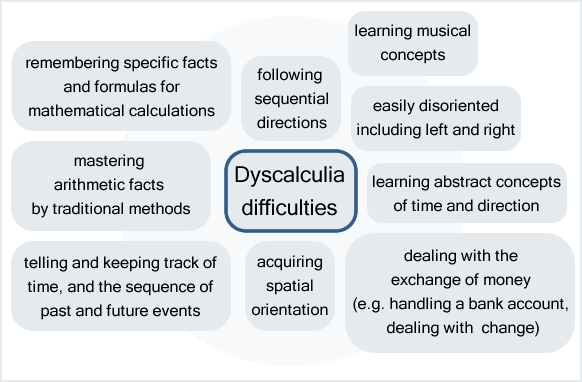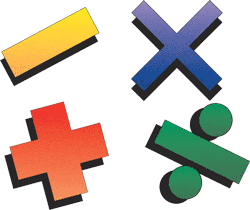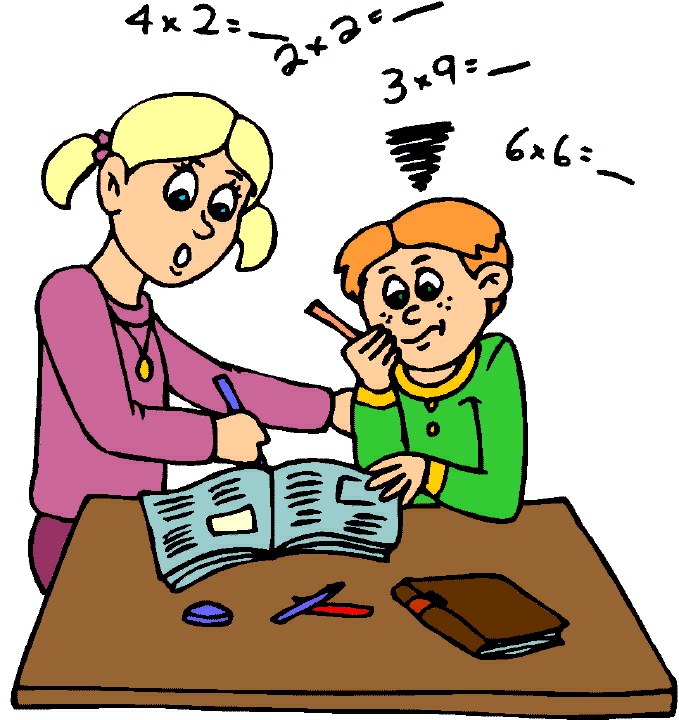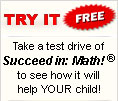Archive for the ‘Treatment for Dyscalculia’ Category
Children With Dyscalculia – Is There A Cure? Tips To Overcome The Learning Disability
Dyscalculia is a learning disability that effects many children and adults (about 3-6% of the population). The learning disability is specific to difficulty in learning and comprehending arithmetic. What this means in layman’s terms is basically math dyslexia.
Is there a cure for dyscalculia?
 While there is no known cure for dyscalculia, there are things children with dyscalculia can do to overcome the challenges they may face.
While there is no known cure for dyscalculia, there are things children with dyscalculia can do to overcome the challenges they may face.
- One of the easiest things a child can do to help them recognize numbers and patterns is to just simply practice. There are many games you can download from the internet. When looking for a dyscalculia game for your child, keep in mind you want it to be age appropriate, you want it to appeal to your child, and you want it to be something your child doesn’t recognize as a “learning” experience. If your child thinks he/she is doing homework, or learning, they may resist.
- Another thing you can do to help your child overcome his/her learning disability is use flash cards. Something as simple as buying (or if money is tight, you can make them) number flash cards. Mix the cards up, and practice number recognition. Make it a game. See how many they can get right. Reward correct answers, and give positive re-enforcement for incorrect answers.
- Buy a bag of jelly beans. Pour a few out onto a table or flat surface. Have your child count out a certain number of jelly beans. Or have him/her separate the jelly beans into piles – one for you and one for them. You can switch colors with them (example: ask your child to switch 2 blues for 2 reds. You can do simple math with the jelly beans. Then after, your child gets to eat them!
- Play a game with a stop watch. Have your child be the time keeper. See how long it takes for someone to run across the yard (or take 10 steps, or anything you can make a race with). Tell your child to watch the clock. Give them a time to stop the clock at (for example, tell them at 8:40 to stop timing.) Show them on the clock where the hands will be.
While there is no cure for dyscalculia, you can treat the symptoms. Remember to use patience and love with your child. They’ll be just fine.  (You can read more tips here.)
(You can read more tips here.)
If you’d like a recommendation for dyscalculia games, Making Math More Fun is one I highly recommend.
Tips On How To Help Your Child Overcome Dyscalculia
As a parent, some of the most challenging times is dealing with your child’s education, development, and homework. When your child enters grade school, the dynamic of it all kind of changes. Before, you used to have complete control over your child’s development, schedule, day, interaction with others…but once school starts, a parent has to hand over the gauntlet to his/her teachers.
Once your child goes to school, some concerns may begin to arise that were never even a concern before. Learning disabilities,and social acceptance are just a few.
 Once it becomes apparent your child has a learning disability, this can shake things up a bit in your world. How do you handle it? How do you help your child overcome it? Many questions can arise, along with fear and stress. Most learning disabilities have treatment options, and different ways to help your child develop on time and on target with the rest of his/her class.
Once it becomes apparent your child has a learning disability, this can shake things up a bit in your world. How do you handle it? How do you help your child overcome it? Many questions can arise, along with fear and stress. Most learning disabilities have treatment options, and different ways to help your child develop on time and on target with the rest of his/her class.
Dyscalculia is one learning disability you may face with your child. It’s much like dyslexia, only it’s having difficulty with simple math concepts. Working with your child to recognize numbers and understand math is obviously the first step. Software to help your child is also available. Making Math More Fun is a printable math games collection I personally recommend.
Tips on How to Help Your Child Overcome Dyscalculia – What to do if your child has dyscalculia
1. Get a math workbook from Target or Walmart (you can usually pick one up for relatively cheap, a few dollars). Start at the beginning. Instead of getting a workbook for your child’s age group, start off with the absolute basic and easiest you can find. Example: preschool and kindergarten levels. This will help you in determining exactly what your child is struggling with, and what they do and don’t understand.
2. Spend some time every night sitting with your child helping them and encouraging them. Watch them answer questions, and answer any questions they might have with patience.
3. Download a software game they can play to help encourage math learning, and recognition.
4. Buy some flash cards (again from Walmart or Target – a few dollars at most). Spend a few minutes each night going through them. Shapes, numbers, and simple addition problems will work the best. (Dyscalculia is not to be confused with a child just struggling with math in general. That’s to be expected. Read more about symptoms of dyscalculia here.)
If your child has been diagnosed with dyscalculia, do not worry. If it’s left untreated of course it can cause issues in your child’s life, but many children are able to overcome this learning disability and go on to become doctors, and lawyers. Do the best you can to support your child emotionally, and offer as much help and guidance as you can…and the rest will follow.
What To Do If Your Child Has Dyscalculia
It can be overwhelming and quite scary when you find out your child has dyscalculia. Many parents often feel lost and confused, and don’t know which direction to turn when they find out their child has a learning disability. You might blame yourself, or become angry at your child. It can be hard for some people to understand why certain things are difficult for certain people.
What To Do If Your Child Has Dyscalculia
 If your child has the learning disability, first of all…take a deep breath. All hope is not lost. It’s a very common learning disability that can be treated with time and patience. If your child is diagnosed with math and dyslexia, you can help them overcome it with these ideas:
If your child has the learning disability, first of all…take a deep breath. All hope is not lost. It’s a very common learning disability that can be treated with time and patience. If your child is diagnosed with math and dyslexia, you can help them overcome it with these ideas:
- Help your child practice basic math skills, either online or offline. You can use flashcards to help recognize shapes and numbers, or software programs to help them understand the basic math skills.
- Check into getting your child a tutor. Make sure that the person you choose has experience and an understanding of what dyscalculia is.
- Talk to your child’s teacher. Come up with a game plan that works for all parties involved. Make sure that your child won’t feel the pressure of peer ridicule.
- Purchase math workbooks and sit with your child while they work through them. Be patient, and remember to give positive encouragement as they get through them.
If your child has been diagnosed with math and dyslexia, don’t worry. You can help your child overcome this with patience and time. Be diligent and understanding. In time, this will be something you both look back on and remember as just being “a learning experience!”
If you would like more information on great learning and practice tools you can use, here is one I personally recommend: Math Worksheets for Children With Dyscalculia.
Treatment for Dyscalculia – What to Do About it
If you’re a parent with a child who has learning disabilities, then you know how difficult it can be to watch your child struggle with something. No parent wants to see their child struggle. Fortunately, there is a treatment for dyscalculia. It takes time and patience, but your child can overcome their dyslexia with math.
 So what exactly is dyscalculia? Dyscalculia is basically dyslexia and math. A child may not be able learn basic math as easily as some of their peers. Dyscalculia in children should be treated and not left alone, because once a child reaches adulthood, math is a required skill for any type of job he/she may wish to acquire.
So what exactly is dyscalculia? Dyscalculia is basically dyslexia and math. A child may not be able learn basic math as easily as some of their peers. Dyscalculia in children should be treated and not left alone, because once a child reaches adulthood, math is a required skill for any type of job he/she may wish to acquire.
Treatments for dyscalculia can vary from child to child (take the quick Does my Child Have Dyscalculia Test here). The most important thing to remember when dealing with a child who has a learning disability is to be patient. Show your child you understand, and you are there for them. Reacting with impatience may make your child feel stupid, and they may close down completely to the idea of learning – which is ultimately the exact opposite of what we’re trying to achieve.
Make sure you child spends time every day working on simple math concepts. Continual practice will really help their advancement. Flash cards, software games, worksheets, anything that keeps them focused. Most children don’t like knowing their doing “homework” , so anything that helps them practice without them feeling as though they’re working is a huge benefit. You can make up a lot of games to play using flash cards.
There are learning programs that allow your child to grow their skills, while also playing games. Two great ones are Making Math More Fun and the Math Board Games Book . They’re simple printable games and worksheets your child can play on, while learning number recognition and other basic math concepts. The great thing about these products, is your child doesn’t realize they are actually learning while they play them.
If you’re looking for a software to help your child with their dyscalculia, the Success In Math Program is a great one. The games can be played on the computer, and they are tailored to your child’s specific needs. You can find out more about the Success in Math Program software right here: Success In Math.
Children with learning disabilities are more often than not completely fine when they reach adults. It’s a hard road, but with love and support your child can overcome their learning disability.
